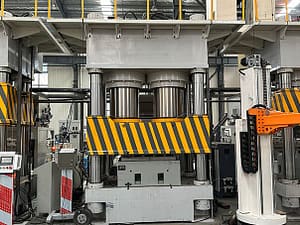Choosing the right presswood pallet can make a huge difference in your logistics, cost efficiency, and environmental impact. With the growing need for sustainable solutions in warehousing and shipping, presswood pallets offer a reliable and eco-friendly option. In this guide, we’ll walk you through the key considerations to help you select the best presswood pallet for your business.

1. Understand the Advantages of Presswood Pallets
Presswood pallets, made from compressed wood fibers, offer several advantages:
- Eco-Friendly: It is made from recycled wood materials, making it a sustainable option.
- Lightweight: They weigh less than traditional wooden pallets, reducing shipping costs.
- Durable: Despite their lightweight, they are strong and resilient, supporting heavy loads.
- Fumigation-Free: Unlike regular wooden-pallets, presswood pallets do not require fumigation, making them ideal for international shipping.
2. Determine the Load-Bearing Capacity
Every business has different weight requirements. Choose a presswood pallet based on the weight it can handle:
- Light-Duty: Suitable for lightweight items, often in the range of 500–800 kg.
- Medium-Duty: Ideal for moderate loads, typically supporting between 800–1,200 kg.
- Heavy-Duty: Best for heavier loads, with a capacity of up to 1,500 kg or more.
Make sure to assess your typical load weight to avoid overloading the pallets, which can impact both safety and durability.
3. Consider Size and Shape
Presswood pallets come in standard sizes, including 1200×800 mm (Euro Pallet) and 1200×1000 mm (Industrial Pallet). Consider the following:
- Product Fit: Choose a size that matches your product dimensions to maximize load efficiency.
- Storage Compatibility: Ensure that the pallet size fits your racking system, shelving, and warehouse layout.
- Ease of Handling: Some presswood pallets come with nestable designs, which reduce storage space and improve stackability.
4. Check Pallet Weight
The weight of the pallet itself affects shipping costs and handling. It is generally lighter than wood or metal pallets. Here’s why weight matters:
- Reduced Freight Costs: A lighter pallet lowers the total shipment weight, saving on transportation costs.
- Ease of Movement: Lightweight pallets are easier to handle manually or with forklifts, improving workplace efficiency.
5. Evaluate Environmental Benefits
Sustainability is a major advantage of presswood pallets. They are made from recycled wood fibers and can be recycled after use. Here’s why choosing environmentally friendly pallets is beneficial:
- Reduced Waste: By choosing a recycled pallet, you minimize wood waste.
- Lower Carbon Footprint: Lightweight pallets reduce fuel consumption in transportation, which helps cut carbon emissions.
6. Analyze Cost vs. Durability
While Molded pallets can be slightly more expensive than traditional wooden pallets, their durability and lightweight design can offset costs. Consider:
- Long-Term Savings: it can last longer with proper handling, reducing replacement frequency.
- Initial Investment: Although presswood pallets may cost more upfront, their durability and eco-friendliness offer long-term value.
7. Assess Maintenance and Reusability
Presswood pallets require minimal maintenance. Here’s what you should know:
- Resistant to Pests: Unlike traditional wood, presswood pallets resist insects, mold, and fungi.
- Reusable: Many presswood pallets can be reused multiple times, depending on handling and load weight.
Choosing the best presswood pallet for your business involves balancing size, load capacity, cost, and environmental benefits. It provide a sustainable and cost-effective solution for businesses looking to optimize logistics and reduce their carbon footprint. Evaluate your specific needs, and consider presswood pallets as a reliable option for your operations.



